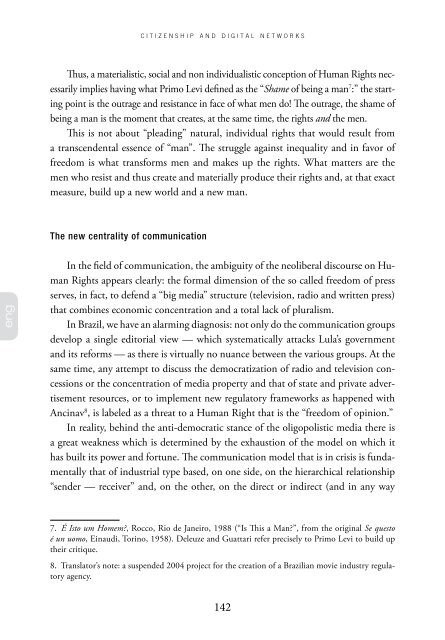Sergio Amadeu da Silveira - Cidadania e Redes Digitais
Sergio Amadeu da Silveira - Cidadania e Redes Digitais
Sergio Amadeu da Silveira - Cidadania e Redes Digitais
Create successful ePaper yourself
Turn your PDF publications into a flip-book with our unique Google optimized e-Paper software.
eng<br />
c i t i z e n s h i p a n d d i g i t a l n e t w o r k s<br />
Thus, a materialistic, social and non individualistic conception of Human Rights necessarily<br />
implies having what Primo Levi defined as the “Shame of being a man 7 :” the starting<br />
point is the outrage and resistance in face of what men do! The outrage, the shame of<br />
being a man is the moment that creates, at the same time, the rights and the men.<br />
This is not about “pleading” natural, individual rights that would result from<br />
a transcendental essence of “man”. The struggle against inequality and in favor of<br />
freedom is what transforms men and makes up the rights. What matters are the<br />
men who resist and thus create and materially produce their rights and, at that exact<br />
measure, build up a new world and a new man.<br />
The new centrality of communication<br />
In the field of communication, the ambiguity of the neoliberal discourse on Human<br />
Rights appears clearly: the formal dimension of the so called freedom of press<br />
serves, in fact, to defend a “big media” structure (television, radio and written press)<br />
that combines economic concentration and a total lack of pluralism.<br />
In Brazil, we have an alarming diagnosis: not only do the communication groups<br />
develop a single editorial view — which systematically attacks Lula’s government<br />
and its reforms — as there is virtually no nuance between the various groups. At the<br />
same time, any attempt to discuss the democratization of radio and television concessions<br />
or the concentration of media property and that of state and private advertisement<br />
resources, or to implement new regulatory frameworks as happened with<br />
Ancinav 8 , is labeled as a threat to a Human Right that is the “freedom of opinion.”<br />
In reality, behind the anti-democratic stance of the oligopolistic media there is<br />
a great weakness which is determined by the exhaustion of the model on which it<br />
has built its power and fortune. The communication model that is in crisis is fun<strong>da</strong>mentally<br />
that of industrial type based, on one side, on the hierarchical relationship<br />
“sender — receiver” and, on the other, on the direct or indirect (and in any way<br />
7. É Isto um Homem?, Rocco, Rio de Janeiro, 1988 (“Is This a Man?”, from the original Se questo<br />
é un uomo, Einaudi, Torino, 1958). Deleuze and Guattari refer precisely to Primo Levi to build up<br />
their critique.<br />
8. Translator’s note: a suspended 2004 project for the creation of a Brazilian movie industry regulatory<br />
agency.<br />
142


